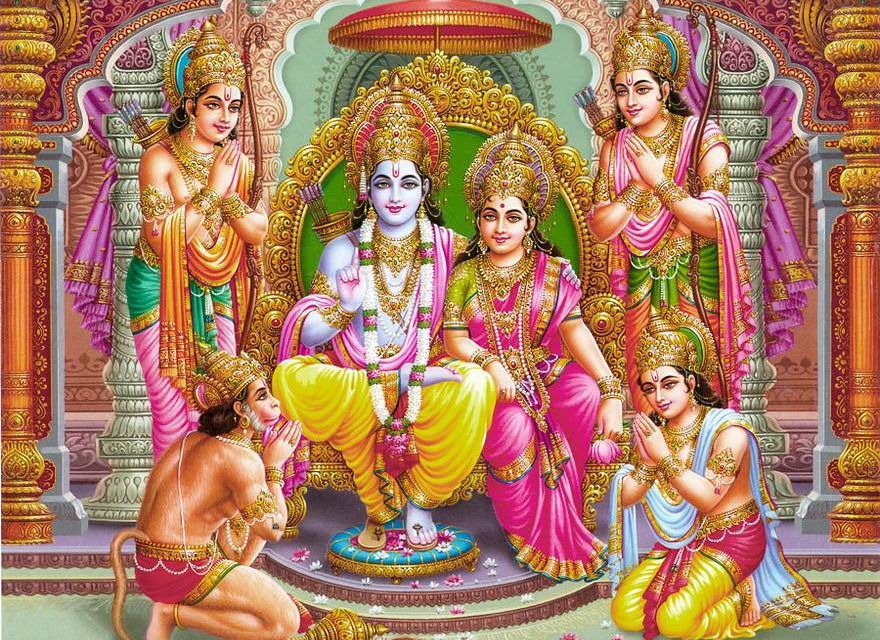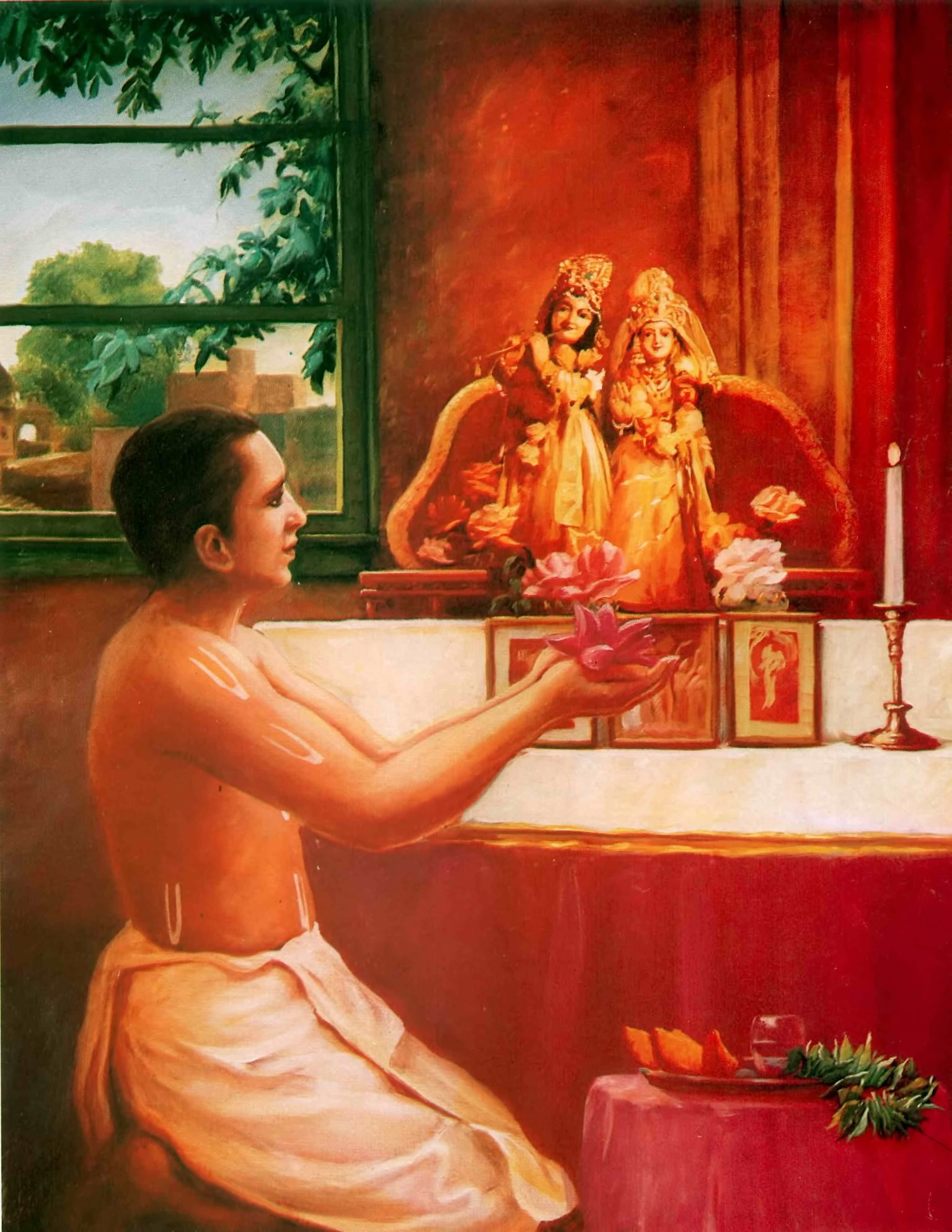Srimad Bhagavatam, Canto 7, Chapter 5
TEXTS 23-24
śrī-prahrāda uvāca
śravaṇaṁ kīrtanaṁ viṣṇoḥ
smaraṇaṁ pāda-sevanam
arcanaṁ vandanaṁ dāsyaṁ
sakhyam ātma-nivedanam
iti puṁsārpitā viṣṇau
bhaktiś cen nava-lakṣaṇā
kriyeta bhagavaty addhā
tan manye ‘dhītam uttamam
SYNONYMS
śrī-prahrādaḥ uvāca—Prahlāda Mahārāja said; śravaṇam—hearing; kīrtanam—chanting; viṣṇoḥ—of Lord Viṣṇu (not anyone else); smaraṇam—remembering; pāda-sevanam—serving the feet; arcanam—offering worship (with ṣoḍaśopacāra, the sixteen kinds of paraphernalia); vandanaṁ—offering prayers; dāsyam—becoming the servant; sakhyam—becoming the best friend; ātma-nivedanam—surrendering everything, whatever one has; iti—thus; puṁsā arpitā—offered by the devotee; viṣṇau—unto Lord Viṣṇu (not to anyone else); bhaktiḥ—devotional service; cet—if; nava-lakṣaṇā—possessing nine different processes; kriyeta—one should perform; bhagavati—unto the Supreme Personality of Godhead; addhā—directly or completely; tat—that; manye—I consider; adhītam—learning; uttamam—topmost.
TRANSLATION
Prahlāda Mahārāja said: Hearing and chanting about the transcendental holy name, form, qualities, paraphernalia and pastimes of Lord Viṣṇu, remembering them, serving the lotus feet of the Lord, offering the Lord respectful worship with sixteen types of paraphernalia, offering prayers to the Lord, becoming His servant, considering the Lord one’s best friend, and surrendering everything unto Him (in other words, serving Him with the body, mind and words)—these nine processes are accepted as pure devotional service. One who has dedicated his life to the service of Kṛṣṇa through these nine methods should be understood to be the most learned person, for he has acquired complete knowledge.
PURPORT
When Prahlāda Mahārāja was asked by his father to say something from whatever he had learned, he considered that what he had learned from his spiritual master was the best of all teachings whereas what he had learned about diplomacy from his material teachers, Ṣaṇḍa and Amarka, was useless. Bhaktiḥ pareśānubhavo viraktir anyatra ca (SB 11.2.42). This is the symptom of pure devotional service. A pure devotee is interested only in devotional service, not in material affairs. To execute devotional service, one should always engage in hearing and chanting about Kṛṣṇa, or Lord Viṣṇu. The process of temple worship is called arcana. How to perform arcana will be explained herein. One should have complete faith in the words of Kṛṣṇa, who says that He is the great well-wishing friend of everyone (suhṛdaṁ sarva-bhūtānām [Bg. 5.29]). A devotee considers Kṛṣṇa the only friend. This is called sakhyam. Puṁsārpitā viṣṇau. The word puṁsā means “by all living entities.” There are no distinctions permitting only a man or only a brāhmaṇa to offer devotional service to the Lord. Everyone can do so. As confirmed in Bhagavad-gītā (9.32), striyo vaiśyās tathā śūdrās te ‘pi yānti parāṁ gatim: although women, vaiśyas and śūdras are considered less intelligent, they also can become devotees and return home, back to Godhead.
After performing sacrifices, sometimes a person engaged in fruitive activity customarily offers the results to Viṣṇu. But here it is said, bhagavaty addhā: one must directly offer everything to Viṣṇu. This is called sannyāsa (not merely nyāsa). A tridaṇḍi-sannyāsī carries three daṇḍas, signifying kaya-mano-vākya-body, mind and words. All of these should be offered to Viṣṇu, and then one can begin devotional service. Fruitive workers first perform some pious activities and then formally or officially offer the results to Viṣṇu. The real devotee, however, first offers his surrender to Kṛṣṇa with his body, mind and words and then uses his body, mind and words for the service of Kṛṣṇa as Kṛṣṇa desires.
Śrīla Bhaktisiddhānta Sarasvatī Ṭhākura gives the following explanation in his Tathya. The word śravaṇa refers to giving aural reception to the holy name and descriptions of the Lord’s form, qualities, entourage and pastimes as explained in Śrīmad-Bhāgavatam, Bhagavad-gītā and similar authorized scriptures. After aurally receiving such messages, one should memorize these vibrations and repeat them (kīrtanam). Smaraṇam means trying to understand more and more about the Supreme Lord, and pāda-sevanam means engaging oneself in serving the lotus feet of the Lord according to the time and circumstances. Arcanam means worshiping Lord Viṣṇu as one does in the temple, and vandanam means offering respectful obeisances. Man-manā bhava mad-bhakto mad-yājī māṁ namaskuru [Bg. 18.65]. Vandanam means namaskuru—offering obeisances or offering prayers. Thinking oneself to be nitya-kṛṣṇa-dāsa, everlastingly a servant of Kṛṣṇa, is called dāsyam, and sakhyam means being a well-wisher of Kṛṣṇa. Kṛṣṇa wants everyone to surrender unto Him because everyone is constitutionally His servant. Therefore, as a sincere friend of Kṛṣṇa, one should preach this philosophy, requesting everyone to surrender unto Kṛṣṇa. Ātma-nivedanam means offering Kṛṣṇa everything, including one’s body, mind, intelligence and whatever one may possess.
One’s sincere endeavor to perform these nine processes of devotional service is technically called bhakti. The word addhā means “directly” One should not be like the karmīs, who perform pious activities and then formally offer the results to Kṛṣṇa. That is karma-kāṇḍa. One should not aspire for the results of his pious activities, but should dedicate oneself fully and then act piously. In other words, one should act for the satisfaction of Lord Viṣṇu, not for the satisfaction of his own senses. That is the meaning of the word addhā, “directly.”
anyābhilāṣitā-śūnyaṁ
jñāna-karmādy-anāvṛtam
ānukūlyena kṛṣṇānu-
śīlanaṁ bhaktir uttamā
[Cc. Madhya 19.167]
“One should render transcendental loving service to the Supreme Lord Kṛṣṇa favorably and without desire for material profit or gain through fruitive activities or philosophical speculation. That is called pure devotional service.” One should simply satisfy Kṛṣṇa, without being influenced by fruitive knowledge or fruitive activity.
The Gopāla-tāpanī Upaniṣad says that the word bhakti means engagement in the devotional service of the Supreme Personality of Godhead, not of anyone else. This Upaniṣad describes that bhakti is the offering of devotional service unto the Supreme Personality of Godhead. To perform devotional service, one should be relieved of the bodily conception of life and aspirations to be happy through elevation to the higher planetary systems. In other words, work performed simply for the satisfaction of the Supreme Lord, without any desire for material benefits, is called bhakti. Bhakti is also called niṣkarma, or freedom from the results of fruitive activity. Bhakti and niṣkarma are on the same platform, although devotional service and fruitive activity appear almost the same.
The nine different processes enunciated by Prahlāda Mahārāja, who learned them from Nārada Muni, may not all be required for the execution of devotional service; if a devotee performs only one of these nine without deviation, he can attain the mercy of the Supreme Personality of Godhead. Sometimes it is found that when one performs one of the processes, other processes are mixed with it. That is not improper for a devotee. When a devotee executes any one of the nine processes (nava-lakṣaṇā), this is sufficient; the other eight processes are included. Now let us discuss these nine different processes.






















